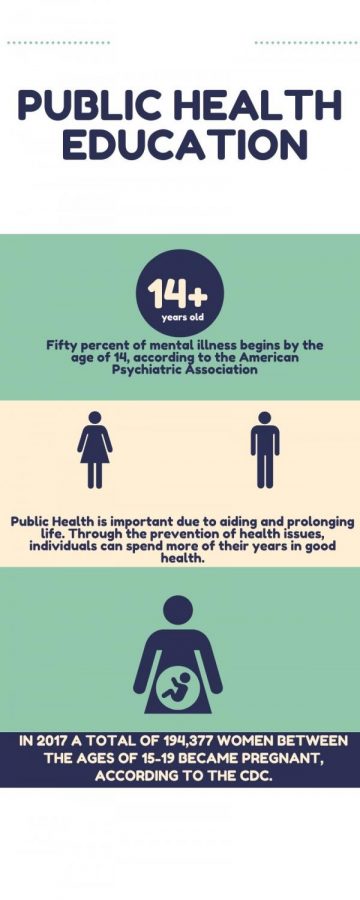Let’s talk about public health
Schools are failing kids to enter the real world
Infographic made by Haden Batchelder
: Understanding the importance of public health can help young kids be mentally and physically healthy years to come. If we are not teaching students the importance of mental wellbeing it can lead students to drug abuse, toxic relationships and bad mental health.
October 13, 2020
As teenagers approach adulthood, they lack education about safe sex, drug abuse and toxic relationships. Knowing about these is crucial before teenagers become functioning adults of society or go into college. Schools are always improving our Advanced Placement classes and trying to focus on students excelling on the ACT, but what about improving the classes about mental health, drug addiction and sex education?
Civic and Hart Research Associates Perspectives of Youth on High School & Social and Emotional Learning did a study showing that 77% of high school students feel that they need to be better educated about emotional and social skills. The survey was taken by 1,300 current high school students and recent graduates.
Poor education will lead students to poor health. Students with mental disorders, abusive situations, drug use and health issues are not getting educated to help their situations. If schools are more prepared in these topics, fewer dropouts will occur. If schools focus on coping skills and emotional skills, lots of students will benefit and understand the importance of mental health.
A study by the United States National Library of Medicine aimed to advance a public health perspective on links between education and health by examining risk and protective factors that might alter the relation between dropping out of high school and subsequent negative outcomes.
Victoria Dinges, senior vice president of Allstate (a foundation focusing on social and emotional learning) stated, “We all play a critical role in helping youth develop the skills and abilities to be productive members of the workforce, engaged citizens in our democracy and fulfilled adults.” It isn’t about quick fixes. It’s about creating meaningful systemic change. Victoria Dinges stated, “That requires us to listen to the ideas that youth have about making the world a better place and providing them with the tools to make their communities better for all.”
Low-income schools deal with this issue more than other schools. As middle schoolers prepare for high school, their sex education is a big issue. The lack of education can lead to teen pregnancy, STDs and poor life choices.
The US library National Library of Medicine did a study between the education people got and how they function in daily life. “Analysis of a representative survey of adults aged >25 years between 1990 and 2000 indicates that the prevalence of several risk behaviors is generally higher among those with fewer than nine years of formal education, begins to decline among those who have nine to 12 years of formal education, and continues to decline with additional years of education; this finding corresponds to the recognized importance of high school completion for subsequent health.”
A study conducted by researchers at Columbia University’s Mailman School of Public Health and the Johns Hopkins Bloomberg School of Public Health has found that girls from low-income families are unprepared for puberty, resulting in negative experiences in the transition. African-American, Caucasian, and Hispanic families in low-income urban areas of the Northeastern United States were lacking education and unprepared for their menstrual cycle.
With schools struggling with sex education, most parents feel unprepared to teach their kids about their bodies and sexual behaviors. With the lack of healthcare, it’s damaging students’ mental health and even grades.
Mental health issues are not addressed in the public health program and it’s showing in the dropout rates and suicide rates among students. This reveals a rise in kids with mental issues.
Fifty percent of mental illness begins by the age of 14, according to the American Psychiatric Association. The World Public Health Association shows 300 million people have depression. Yet students don’t get taught about the signs, causes, or resources in schools.
As a result of a lack of education, teen pregnancy is a fear for most teens but a reality for others. In 2017, a total of 194,377 women between the ages of 15-19 became pregnant, according to the Centers for disease control and prevention. However, schools treat pregnant teens like a burden rather than supporting them. This leads to females being kicked out of school. At the end of the day, we should support these young mothers instead of shaming them.
According to ThinkProcess charter schools in Louisiana received significant backlash for its policy forbidding pregnant students from remaining on campus. Then the school administrators force this student to take a pregnancy test. Then they refuse her to not come back to campus.
As a student, I feel like the public school system is failing lots of students. I never learn if I am being truly manipulated by a partner. Students will never learn how to properly cope with emotions. I believe if the school wants healthy students they need to put more work in a program that will educate mentally and emotionally.







